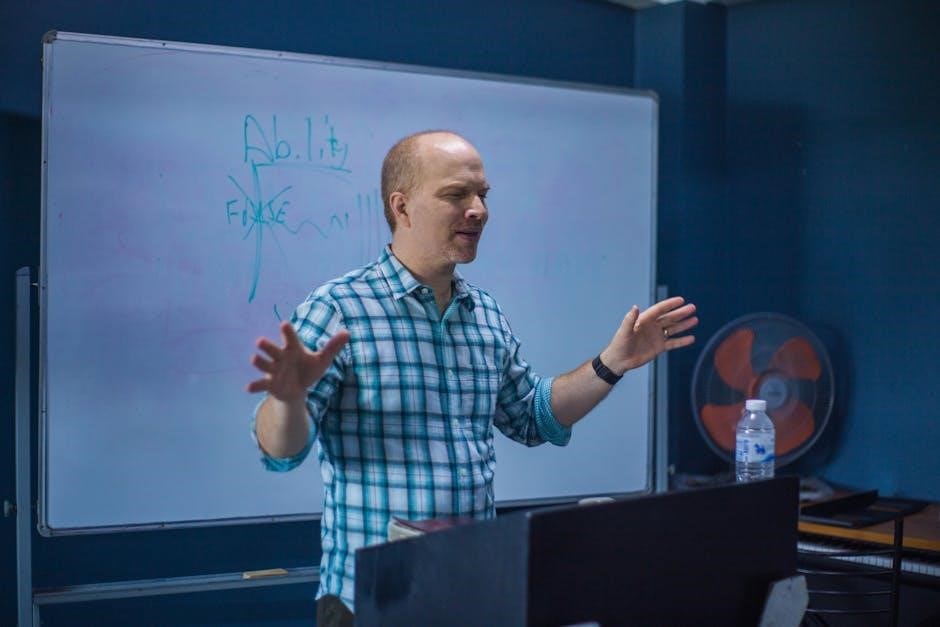instructional facilitator
An Instructional Facilitator is an educator who supports teachers in improving instructional practices‚ integrating technology‚ and aligning curriculum with standards to enhance teaching quality and student outcomes.
Definition and Overview
An Instructional Facilitator is an educator who works collaboratively with teachers to enhance instructional practices‚ curriculum implementation‚ and student learning outcomes. They serve as a resource‚ providing coaching‚ professional development‚ and support to ensure effective teaching strategies and alignment with educational standards.
Facilitators bridge the gap between curriculum design and classroom delivery‚ ensuring that instructional practices are research-based‚ equitable‚ and tailored to meet the diverse needs of all learners‚ ultimately fostering a culture of continuous improvement in education.
Importance in Modern Education
Instructional Facilitators play a vital role in modern education by supporting teachers in adopting innovative practices and integrating technology to enhance student learning. They ensure curriculum alignment with educational standards‚ fostering a culture of continuous improvement and equity in education. Their work directly impacts student outcomes by improving engagement and academic performance‚ making them essential for fostering effective and adaptive learning environments in schools.

Key Responsibilities of an Instructional Facilitator
Instructional Facilitators coach teachers‚ develop lesson plans‚ integrate technology‚ and support professional development to enhance teaching effectiveness and student learning outcomes in educational settings.
Coaching and Mentoring Teachers
Facilitators provide individualized coaching and mentoring to teachers‚ offering strategies to improve classroom management‚ pedagogy‚ and content delivery. This support helps educators refine their instructional techniques‚ fostering a collaborative environment that enhances teaching effectiveness and student engagement. Through observation‚ feedback‚ and co-teaching‚ facilitators empower teachers to adopt best practices‚ ensuring high-quality instruction and professional growth aligned with educational standards and goals. This targeted support is essential for educator development and student success.
Developing and Implementing Lesson Plans
Instructional Facilitators play a key role in designing and executing effective lesson plans that align with educational standards. They collaborate with teachers to create engaging‚ research-based curricula‚ ensuring clarity and alignment with learning objectives. By providing resources and strategies‚ facilitators help educators deliver high-quality instruction tailored to diverse student needs‚ fostering academic success and continuous improvement in teaching practices.

Integrating Technology in the Classroom
Instructional Facilitators are instrumental in integrating technology into educational settings‚ supporting teachers in using digital tools to enhance teaching and learning. They assist in implementing technology-based lesson plans‚ providing training on educational software‚ and ensuring seamless integration of devices and platforms. By fostering a tech-savvy environment‚ facilitators help educators engage students more effectively‚ promoting interactive and personalized learning experiences that align with modern educational demands and prepare students for future challenges.

Professional Development and Support
Instructional facilitators plan and deliver professional development programs‚ focusing on effective instructional strategies and providing ongoing support to help teachers enhance their skills and outcomes;
Planning and Delivering Professional Development Programs
Instructional facilitators design and implement professional development programs tailored to teacher needs‚ focusing on effective instructional strategies and foundational skills. They assess skill gaps‚ create engaging content‚ and deliver training to enhance teaching practices. These programs often include workshops‚ coaching sessions‚ and resource sharing to ensure teachers can apply new strategies effectively. Follow-up support is provided to help educators implement changes‚ addressing challenges and fostering continuous improvement in the classroom.
Evaluating and Refining Instructional Strategies
Instructional facilitators collaborate with teachers to assess and enhance teaching methods‚ ensuring alignment with educational standards. They observe classroom practices‚ provide constructive feedback‚ and analyze data to identify areas for improvement. By refining instructional strategies‚ facilitators help teachers adapt to student needs‚ integrate technology‚ and adopt innovative approaches. This process fosters a culture of continuous improvement‚ enabling educators to deliver high-quality instruction and maximize student learning outcomes effectively.

Addressing the Needs of Struggling Learners
Instructional facilitators play a crucial role in identifying and supporting struggling learners by developing tailored strategies and resources. They collaborate with teachers to design personalized learning plans‚ incorporating differentiated instruction and technology. Facilitators also provide professional development focused on addressing diverse learning needs‚ ensuring educators are equipped to help students overcome challenges. By fostering an inclusive environment‚ they contribute to equitable education‚ enabling all learners to achieve academic success and build confidence in their abilities.

The Role in Curriculum Development
Instructional facilitators contribute to curriculum development by aligning it with educational standards and collaborating with educators to design effective learning plans that meet student needs and enhance instruction.
Aligning Curriculum with Educational Standards
Instructional facilitators ensure curriculum alignment with educational standards by reviewing and adapting learning materials‚ collaborating with educators‚ and implementing best practices to meet regulatory requirements. They work closely with teachers to design lessons that address core competencies‚ fostering a cohesive educational framework. This process involves assessing existing curricula‚ identifying gaps‚ and integrating updates to ensure all students meet expected learning outcomes‚ ultimately enhancing the quality and relevance of education.

Collaborating with Educators and Administrators
Instructional facilitators collaborate with educators and administrators to support curriculum development and implementation. They work closely with teachers to design effective lesson plans and provide resources‚ while also partnering with administrators to align instructional strategies with school goals. This collaboration fosters a supportive environment for both teachers and students‚ ensuring that educational objectives are met and teaching practices remain aligned with district and state standards.
Leadership and Collaboration
Instructional facilitators provide leadership in instructional practices‚ fostering collaboration among teachers and staff to support professional growth and align strategies with educational goals.
Providing Leadership in Instructional Practices
An Instructional Facilitator guides educators in adopting innovative teaching methods‚ models exemplary practices‚ and supports the implementation of research-based strategies. They foster a culture of continuous improvement‚ ensuring alignment with educational standards and goals. By leading professional development initiatives‚ they empower teachers to enhance classroom effectiveness‚ ultimately benefiting student success and school-wide achievement.
Facilitating Collaboration Among Teachers and Staff
Instructional Facilitators foster teamwork by organizing collaborative meetings and professional learning communities. They encourage knowledge-sharing among educators‚ promoting collective problem-solving and resource development. By bridging communication gaps‚ they ensure a unified approach to teaching strategies‚ curriculum alignment‚ and student support. This collaborative environment enhances instructional effectiveness and strengthens the overall educational community‚ leading to improved student outcomes and a more cohesive school culture. Their role is instrumental in building a cooperative and resourceful staff.
Qualifications and Requirements
Instructional Facilitators typically require a bachelor’s degree‚ teaching certification‚ and relevant experience. They must possess strong leadership‚ communication‚ and curriculum development skills to support educators effectively.
Necessary Education and Certifications
An Instructional Facilitator typically requires a bachelor’s degree in education or a related field. Teaching certification is often mandatory‚ along with relevant teaching experience. Advanced roles may demand a master’s degree. Certifications in instructional technology or curriculum design can enhance qualifications. Professional development and continuous learning are expected to stay updated on educational trends and standards.
Essential Skills and Experience
An Instructional Facilitator should possess strong leadership‚ communication‚ and interpersonal skills to effectively coach and mentor teachers. Experience in curriculum development and classroom instruction is crucial. They must demonstrate expertise in integrating technology and applying evidence-based instructional strategies.Facilitators need a deep understanding of educational standards and the ability to collaborate with diverse stakeholders. Prior teaching experience and a track record of improving student outcomes are often required; Strong organizational and problem-solving skills are also essential for this role.
Technology Integration in Education
Instructional facilitators support the integration of technology by providing resources and training to teachers‚ ensuring effective use of digital tools to enhance learning experiences and student engagement.
Supporting the Use of Educational Technology
Instructional facilitators play a crucial role in supporting the use of educational technology by providing professional development‚ coaching teachers‚ and ensuring effective integration of digital tools in classrooms. They assist in selecting appropriate technologies‚ implementing new software‚ and troubleshooting technical issues. Facilitators also help teachers design engaging‚ tech-enhanced lesson plans that align with curriculum standards‚ fostering a collaborative environment where technology enhances teaching and learning outcomes for all students.

Enhancing Digital Learning Experiences
Instructional facilitators enhance digital learning experiences by integrating innovative technologies and strategies that create immersive‚ interactive‚ and personalized learning environments. They work closely with teachers to design engaging lessons‚ leveraging tools like interactive whiteboards‚ educational software‚ and online platforms. Facilitators also promote collaboration among students through digital projects and virtual learning spaces‚ ensuring equitable access to resources. By fostering a technology-rich classroom culture‚ they empower students to develop essential 21st-century skills‚ preparing them for future success in a rapidly evolving world.
Impact on Student Outcomes
Instructional facilitators improve academic performance and engagement by aligning curriculum with educational standards‚ ensuring students meet learning objectives effectively and achieve measurable academic growth.
Improving Academic Performance
Instructional facilitators enhance academic performance by providing coaches and resources to teachers‚ ensuring alignment with educational standards and effective instructional strategies‚ leading to measurable student progress and improved learning outcomes.
Enhancing Student Engagement and Involvement
Instructional facilitators play a crucial role in enhancing student engagement by supporting teachers in designing interactive and inclusive lesson plans. They integrate technology and innovative teaching strategies to captivate students’ interest‚ fostering active participation and motivation. By aligning instruction with diverse learning needs‚ facilitators help create environments where students feel valued and encouraged to contribute‚ leading to increased involvement and a more dynamic learning experience.

The Future of Instructional Facilitation
The future of instructional facilitation lies in adapting to emerging trends like technology integration‚ personalized learning‚ and evolving educational needs‚ ensuring continuous growth and innovation in education.
Emerging Trends and Innovations
Emerging trends in instructional facilitation include integrating advanced technologies like AI and virtual reality to enhance learning experiences. Personalized learning strategies and data-driven instruction are gaining prominence‚ enabling facilitators to tailor support for diverse student needs. Professional development programs are increasingly focusing on innovation‚ equipping educators with tools to adapt to evolving educational demands. These trends emphasize the role of facilitators in fostering a dynamic‚ tech-savvy‚ and inclusive educational environment that prepares students for future challenges.
Adapting to Evolving Educational Needs
Instructional facilitators are pivotal in adapting educational practices to meet changing demands. They identify emerging challenges and collaborate with educators to implement innovative solutions. By staying informed about educational trends‚ facilitators help schools adopt effective strategies. Their efforts ensure teaching methods remain relevant and responsive to student needs‚ fostering a dynamic and adaptive learning environment that supports continuous improvement and addresses diverse educational requirements effectively.
